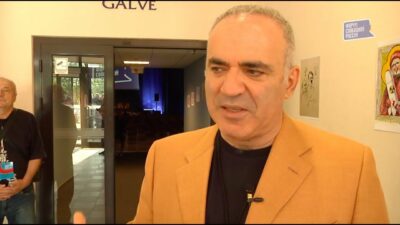
The poisoning of Alexei Navalny, a prominent critic of Russian president Vladimir Putin, has brought Russian relations with Western countries to a perilous impasse.
After doctors in Berlin identified the substance used as a military-grade nerve agent of the novichok group, German chancellor Angela Merkel issued a sharp condemnation: Mr. Navalny was “meant to be silenced,” she said, adding: “This raises very difficult questions that only the Russian government can answer, and must answer.”
German cabinet ministers raised the possibility of stopping the controversial gas pipeline project Nord Stream 2 — an idea Ms. Merkel now refuses to rule out. Kremlin spokesman Dmitri Peskov flatly rejected the notion. Vyacheslav Volodin, speaker of the Russian parliament, accused “foreign powers” of “creating tensions.” Kremlin-controlled media is churning out disinformation.
Now it is Berlin that will have to answer difficult questions. Can Germany find an appropriate next move that does not look like an embarrassing climb-down? Can it, since it now holds the EU’s rotating six-month presidency, broker a consensus on how to deal with Russia in a divided Europe? How to combine sanctions with a policy that does not punish civil society or close the door to pragmatic co-operation?
Finding a national consensus will be hard enough. Germany’s mainstream parties are torn over Russia. Some of the harshest critics are the conservative foreign policy committee chair (and would-be heir to Ms. Merkel) Norbert Röttgen; his competitor, the businessman Friedrich Merz; finance minister Olaf Scholz, a center-left Social Democrat; and the leadership of the Liberals and the Greens. Defenders include the conservative economy minister, Peter Altmaier; fellow-conservative state premier Armin Laschet (in the running to be chancellor); and the leaders of the Social Democratic party.
The left-wing Die Linke party and the hard-right Alternative for Germany are firmly united in their support for Moscow and its pipeline. Die Linke’s foreign policy speaker, Gregor Gysi, suggested the attack on Mr. Navalny might have been perpetrated by “an enemy” of Nord Stream 2. Alexander Gauland, the AfD’s legislative leader, rejected sanctions, as no German had been harmed.
Divisions are also evident at EU level. While Josep Borrell, the EU foreign minister, has condemned the use of novichok against Mr. Navalny, member states are not united. Poland and the Baltic nations are fiercely opposed to the Kremlin, while Hungary, Italy and France have cultivated warmer relations, argued for lifting of EU sanctions, or attempted a policy “reset.”
As a result it would be easy for the EU to backtrack. That would be a huge mistake. There can be little doubt that Mr. Navalny’s poisoning was undertaken with the knowledge or tacit permission of the Kremlin; a German weekly has reported that the type of novichok used is a new and particularly lethal version, leading investigators to conclude that the perpetrators were authorized by the Russian government.
The attack comes amid historic protests in Belarus, and just two weeks before regional elections in Russia, an important mood test in a restive, anxious country.
Germany should now take the lead and pronounce that enough is enough. The Kremlin’s cynical message is directed not just at its domestic critics, but also at Western governments. It says: We can act with impunity anywhere and you can’t stop us. Its purpose is to humiliate, enervate and paralyze its rivals — both painfully and publicly. Europe’s sovereignty and self-respect require a crisp, hard answer.
Sanctions — if they are to be targeted at those responsible for the crime rather than a blanket punishment of civilians — demand a complex and lengthy identification of the perpetrators and their chain of command. Pending that, Germany should immediately offer asylum to Mr. Navalny and suspend Nord Stream 2 (reserving the option of cancelling the project altogether).
Meanwhile, the EU should pursue illicit financial flows and corruption, and help renovate the Ukrainian transit pipeline. In the short term, there are many other suppliers of liquid natural gas than Russia; in the long term, the EU needs to move decisively to green fuels. It must modernize energy infrastructure and supply security across Europe, allowing no national exemptions from EU energy regulations. It should also offer refuge to those persecuted by Russia and study visas to the young.
That, rather than offers of dialogue, is the language the Kremlin understands.
Editor’s Note:
With Europe’s self-respect and sovereignty now on the line, Germany should lead a multifaceted and crisp European response to the poisoning of Russian opposition politician Alexei Navalny, argues Constanze Stelzenmüller. This post originally appeared in the Financial Times.



